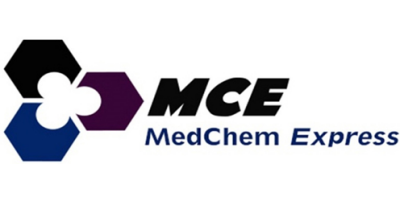

- Home
- Companies
- MedChemExpress LLC (MCE)
- Products
- MedChemExpress - Model ...
MedChemExpress - Model Medetomidine-13C,d3 hydrochloride - 1216630-06-6
Medetomidine-13C,d3 (hydrochloride) is a deuterated labeled Medetomidine (hydrochloride)[1]. Medetomidine hydrochloride is an orally active α2-adrenoceptor agonist (Ki: 1.08 nM). Medetomidine hydrochloride has sedative and analgesic effects. Medetomidine hydrochloride can cause peripheral vasoconstriction through the activation of α2 adrenoceptors on blood vessels[2][3][4][5].MCE products for research use only. We do not sell to patients.
Medetomidine-13C,d3 hydrochloride
MCE China:Medetomidine-13C,d3 hydrochloride
Brand:MedChemExpress (MCE)
Cat. No.HY-17034BS1
CAS:1216630-06-6
Synonyms:MPV785-13C,d3
Storage:Please store the product under the recommended conditions in the Certificate of Analysis.
Shipping:Room temperature in continental US; may vary elsewhere.
Description:Medetomidine-13C,d3 (hydrochloride) is a deuterated labeled Medetomidine (hydrochloride). Medetomidine hydrochloride is an orally active α2-adrenoceptor agonist (Ki: 1.08 nM). Medetomidine hydrochloride has sedative and analgesic effects. Medetomidine hydrochloride can cause peripheral vasoconstriction through the activation of α2 adrenoceptors on blood vessels.
In Vitro:Stable heavy isotopes of hydrogen, carbon, and other elements have been incorporated into drug molecules, largely as tracers for quantitation during the drug development process. Deuteration has gained attention because of its potential to affect the pharmacokinetic and metabolic profiles of drugs[1].Medetomidine (0-1 μM, 1 h) hydrochloride inhibits aldosterone release from the adrenocortical cell suspension[8].Medetomidine (10 nM) hydrochloride activates a kicking response in Cyprids[9].Medetomidine (1 μM) hydrochloride increases cellular cAMP production by activating β-like receptors in CHO cells[9].
In Vivo:Medetomidine (200 μg/kg, p.o. or i.m.) hydrochloride induces a sedation in cats[5].Medetomidine (20 μg/kg, i.v.) hydrochloride shows sedative and analgesic effects in dogs[6].Medetomidine (0.05-0.3 mg/kg, s.c.) hydrochloride protects against Diazinon-induced toxicosis in mice[7].
Hot selling product:L-Ascorbic acid 2-phosphate (trisodium) | Palmitoleic acid | BW-723C86 | Lithocholic acid | Lenvatinib (mesylate) | Chlorogenic acid | NDI-091143 | Azithromycin | Cephaeline | ITE
Trending products:Recombinant Proteins | Bioactive Screening Libraries | Natural Products | Fluorescent Dye | PROTAC | Isotope-Labeled Compounds | Oligonucleotides
References:
[1]. Russak EM, et al. Impact of Deuterium Substitution on the Pharmacokinetics of Pharmaceuticals. Ann Pharmacother. 2019 Feb;53(2):211-216. [Content Brief]
[2]. Russak EM, et al. Impact of Deuterium Substitution on the Pharmacokinetics of Pharmaceuticals. Ann Pharmacother. 2019;53(2):211-216. [Content Brief]
[3]. Kallio A, et al. Acute effects of medetomidine, a selective alpha 2-adrenoceptor agonist, on anterior pituitary hormone and cortisol secretion in man. Acta Endocrinol (Copenh). 1988 Sep;119(1):11-5. [Content Brief]
[4]. R Virtanen, et al. Characterization of the selectivity, specificity and potency of medetomidine as an a2-adrenoceptor agonist. [Content Brief]
[5]. O. B. Ansah, et al. Comparing oral and intramuscular administration of medetomidine in cats.
[6]. Kuo WC, et al. Comparative cardiovascular, analgesic, and sedative effects of medetomidine, medetomidine-hydromorphone, and medetomidine-butorphanol in dogs. Am J Vet Res. 2004 Jul;65(7):931-7. [Content Brief]
[7]. Yakoub LK, et al. Medetomidine protection against diazinon-induced toxicosis in mice. Toxicol Lett. 1997 Sep 19;93(1):1-8. [Content Brief]
[8]. Jager LP, et al. Effects of atipamezole, detomidine and medetomidine on release of steroid hormones by porcine adrenocortical cells in vitro. Eur J Pharmacol. 1998 Apr 3;346(1):71-6. [Content Brief]
[9]. Ulrika Lind, et al. Octopamine receptors from the barnacle balanus improvisus are activated by the alpha2-adrenoceptor agonist medetomidine. [Content Brief]
Brand introduction:
• MCE (MedChemExpress) has a global exclusive compound library of more than 200 kinds, and we are committed to providing the most comprehensive range of high-quality small molecule active compounds for scientific research customers around the world;
• More than 50,000 highly selective inhibitors and agonists are involved in various popular signaling pathways and disease areas;
• The products cover a variety of recombinant proteins, peptides, commonly used kits, more PROTAC, ADC and other characteristic products, widely used in new drug research and development, life science and other scientific research projects;
• Provide virtual screening, ion channel screening, metabolomics analysis detection analysis, drug screening and other professional technical services;
• It has a professional experimental center and strict quality control and verification system;
• Provide LC/MS, NMR, HPLC, chiral analysis, elemental analysis and other quality inspection reports to ensure the high purity and high quality of products;
• The biological activity of the products has been verified by the experiments of customers in various countries;
• A variety of top journals such as Nature, Cell, Science and pharmaceutical patents have included the scientific research results of MCE customers;
• Our professional team tracks the latest pharmaceutical and life science research and provides you with the latest active compounds in the world;
• It has established long-term cooperation with the world's major pharmaceutical companies and well-known scientific research institutions。
